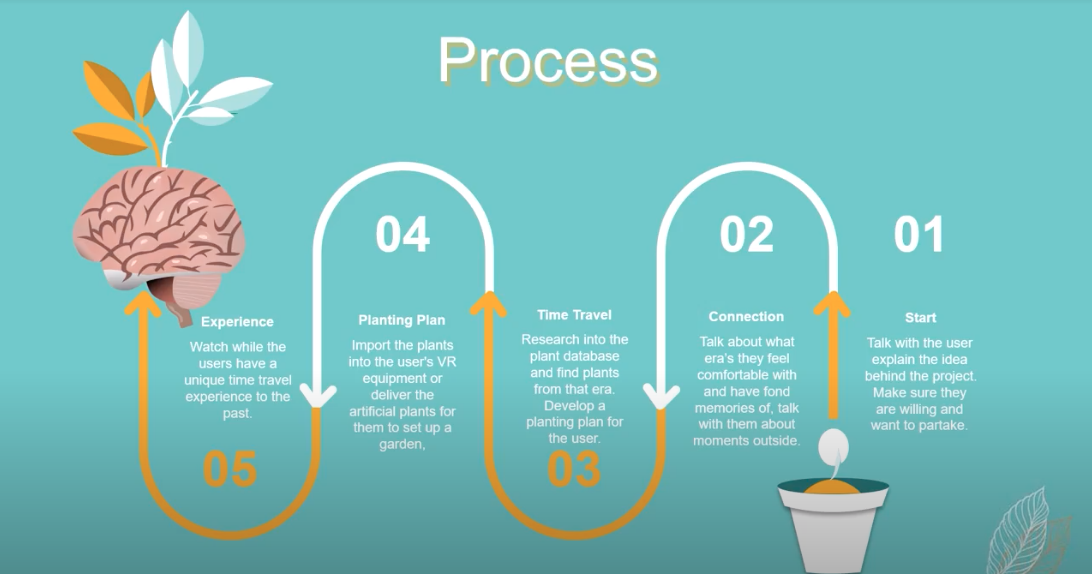︎ Healing Landscape
A memory focused artificial healing garden based on different eras around aging populations.
By Kevin Bechard ︎

This memory focused project is one that was inspired by years of research on evidence-based medicine dealing with nature. This project utilizes biomimicry, digital interventions, and full garden design for a building. Healing Landscapes is a time-sensitive interactive indoor garden for hospitalized people and stay at home residents to help increase mental wellbeing.

Rememberance Garden Proposal for a Hospital / 2020
With evidence-based design (EBD) research, a new type of landscape can be incorporated inside the hospital system, helping those who feel “trapped”. This also brings awareness to forgotten Landscapes- landscapes that are no longer prevalent in our world. The design will help bring awareness of lost landscapes to new generations which helps to close the generational gap by focusing on palliative care for the aging generation. The care is meant for help in providing relief from stress and improves the quality of life of the patients and their families.
By going back in time and connecting these landscapes to those in palliative care systems, we can help fight climate change and other illnesses with generational landscapes. Healthcare gardens are not a new idea, but the memory component is.

Healing Landscape 5 Stage Process / 2020
Mobile App preview / 2020
The “lite” version of this proposal would focus on developing a website or app around landscapes from different eras. There would be a drop-down menu with a list of species from the 1920’s-2010’s and these species along with sounds could be picked for delivery surrounding the user's past climate. These plants would be delivered and would be installed around the room. The website or app would provide you a personal garden assistant from that era to help you install your artificial generational garden.
Design to Outcomes
The design is a healing garden that combines biophilia and reminiscence therapy; the virtual or artificial plants make it easier to replicate past landscapes. This will improve life satisfaction, quality of life, reduce depressive symptoms in older adult populations. While at the same time, teach younger populations about a landscape that once existed.
︎
Works Cited
Chiang, Kai-Jo, et al. “The Effects of Reminiscence Therapy on Psychological Well-being, Depression, and Loneliness among the Institutionalized Aged.” International Journal of Geriatric Psychiatry, vol. 25, no. 4, John Wiley & Sons, Ltd, 4/2010, pp. 380–88, doi:10.1002/gps.2350.
Humphreys, Aelys M, et al. “Global Dataset Shows Geography and Life Form Predict Modern Plant Extinction and Rediscovery.” Nature Ecology & Evolution, vol. 3, no. 7, 7/2019, pp. 1043–47, doi:10.1038/s41559-019-0906-2.
Hunter, Gillespie, W., B., Chen, & Yu-Pu, S. (2019, March 15). Urban Nature Experiences Reduce Stress in the Context of Daily Life Based on Salivary Biomarkers. Retrieved March 8, 2020, from https://www.frontiersin.org/articles/10.3389/fpsyg.2019.00722/full
Munawar, Khadeeja, et al. “Understanding the Reminiscence Bump: A Systematic Review.” PloS One, vol. 13, no. 12, Public Library of Science, 2018, p. e0208595, doi:10.1371/journal.pone.0208595.
“This Facility Created A 1950s Town To Care For Alzheimer’s Patients.” YouTube, 23 Mar. 2020, www.youtube.com/watch?v=_IySI_7LXmM&t=12s. Accessed 16 Apr. 2020.
“Robotic Pets Are Helping Dementia Patients (HBO).” YouTube, 7 Oct. 2017, www.youtube.com/watch?v=cFvGAL9tesM&feature=youtu.be. Accessed 16 Apr. 2020